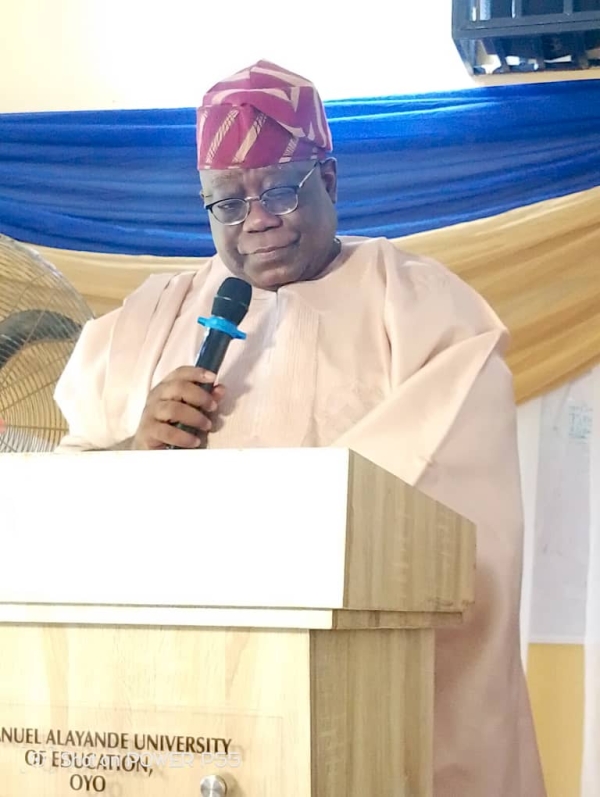Federal Civil Service Commission chairman, Prof. Tunji Olaopa, has urged university workers to embrace decentralised industrial relations for development.
Delivering the second Distinguished Personality Lecture of the Emmanuel Alayande University of Education, he decried a development whereby workers, especially in the university system make a case for federalism but they do not extend it to the university system.
He spoke on the theme “Reforming the Reform of the Education Sector in Nigeria”.
According to him, “Labour unions in Nigeria, NLC, TUC, ASUU and all, have historically been quite vocal and uncompromising regarding reform drives by the federal government to decentralise industrial relations in Nigeria.
“The opposition stems from concerns about loss of collective bargaining power and the potential risk that their ability to negotiate with employers and protect workers rights might be weakened,” he said.
“Besides, union leadership worries that decentralization of IR could be exploited by governments to undermine their influence and powers to mobilise the full arsenal of unions in standing against anti-workers policy changes and programmes.”
He noted that the activism of labour that resulted in Communist-Leninist-Aluta type activism under the military dictatorship up unto 1999 was still what labour leaders were deploying in a democratic setting.
“My take on the subject matter is well known, that a shift from adversarial militancy-propelled unionism to a much more developmental-technical-rational model industrial relations is core to achieving the measure of industrial harmony that is an irreducible critical success factor to redoubling Nigeria’s transformation journey in the hand of a responsible visionary transformational leader
“with game-changing passion. For me, we cannot be doing same thing year in year out in spite of changing realities and dynamics and expect great results. Indeed, we cannot be demanding the restructuring of the federation for true federalism that activates good governance in a developmental state in one breath, and demand university autonomy to boot, in the context of today’s conversation in another, – and all at once perpetually stand in opposition to a critical tactical element of true federalism as decentralized industrial relations. It is contradictory and self-serving and less than patriotic.
“I however agree that such shift embeds nuances and designe angles that will require significant no-hold conversation to unlock many binding constraints that are needed to harvest the full potentials of Tripartism as shared vision and passion for unhindered progress in the workplace and the national transformation journey.”
Earlier, Olaopa described Prof Olanrewaju Ademola Olaniyan, pioneer Vice Chancellor of the Emmanuel Alayande University as one of the star faculty members of the social sciences family at the University of Ibadan where he also trained.
While reviewing the nation’s educational system, he faulted the National Policy on Education (NPE) which according to him should factor into it the realization of its objectives, Nigeria’s colonial heritage, the dominance of western education, the dismal economic performance of the past years, the growing demographic factors—like gender and youth—that has steadily increased the demand for education and human capital development .. and even more important is the political direction that the centralization of education administration took.
In reviewing the NPE further, he said there should be synergy in building and development aspirations in what he considers should be a balance between learning to know, learning to do, and learning to live together.
According to him, among othe reasons, regarding what is wrong with the education system in Nigeria, there is a-developmental federalism in the education sector .
“The education sector has been caught up in the unitary federalism that the military imposed on Nigeria’s political culture. The implication is that the federal government is then forced to take up the burden that ought to be creatively shared if not devolved in total, to the other tiers of the federation.and the lack of cogent data and statistics to back up the performance of the education sector across the states and local governments.”
Olaopa also spoke on the low-skills equilibrium, non-employability of graduates and the low wealth creation capability of the Nigerian education system.
“Therefore, beyond the technical issues of low teacher quality, lack of integrated curriculum, lack of the recognition of non-formal education, the low status of technical and vocational education and the gender imbalance, I am concerned with the larger question involving the overall disconnection between the NPE and Nigeria’s search for an economic and governance template that will be driven by the human capital development the education sector is supposed to initiate.
“The other dimension of this deficiency is that the Nigerian education system is not grounded in entrepreneurial and skill acquisition that prepares the students for the future except unfortunate pawns in the scramble for white collar jobs. In other words, Nigeria’s education system is not generating wealth and self-dependence and self-reliance. “




